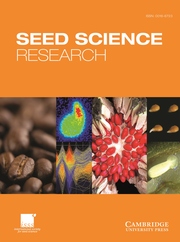Article contents
Filling gaps in the seed dispersal effectiveness model for Prosopis flexuosa: quality of seed treatment in the digestive tract of native animals
Published online by Cambridge University Press: 28 October 2020
Abstract
For endozoochorous species, the quality component of seed dispersal effectiveness depends in part on the treatment seeds receive in the animal's gut. Covering a variety of taxa, diet, digestion system and body size of Prosopis flexuosa seed dispersers, we analysed differences among species in (1) mean retention time of ingested seeds, (2) recovery of viable seeds, (3) seed germination in comparison with seeds collected from trees and (4) germination of seeds after two different periods of retention in the gut. Feeding experiments were conducted with captive individuals of Dolichotis patagonum, Lycalopex gymnocercus, Rhea americana, Chelonoidis chilensis and Lama guanicoe. On the first day, we provided them with fruits containing controlled amounts of seed, and on the subsequent days, we collected faeces in order to recover seeds. We performed germination and viability tests on seeds coming from faeces and collected from trees. The results showed differences among species in the mean retention time of seeds. Chelonoidis chilensis had the longest mean retention time, but its effect on seed recovery and germination was similar to that of the other species, except for L. guanicoe, which showed the lowest seed recovery. When scarification and promotion of seed germination were considered, herbivorous mammals and tortoises (L. guanicoe, D. patagonum and C. chilensis) were the ones increasing germinability, whereas R. americana and L. gymnocercus did not significantly increase final seed germination percentage, which was similar to that for seeds collected from trees. P. flexuosa seeds receive a variety of treatments from endozoochorous dispersers, which might result in an overall fitness benefit for a plant living in unpredictable environments.
- Type
- Research Paper
- Information
- Copyright
- Copyright © The Author(s), 2020. Published by Cambridge University Press
References
- 8
- Cited by



